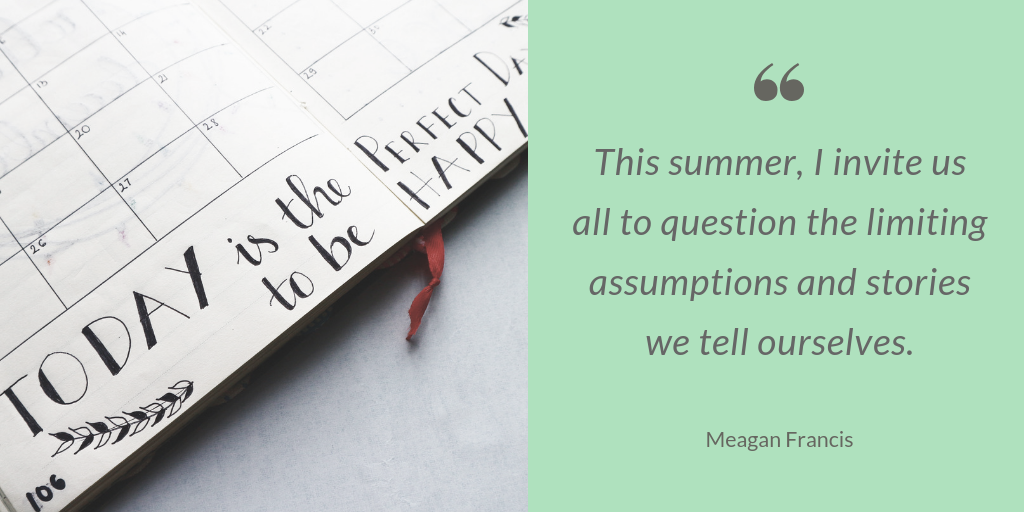This essay originally appeared in our monthly newsletter for The Mom Hour podcast. To get our emails, subscribe here. –Meagan
Since my ex-husband and I separated over two and a half years ago, we’ve kept roughly the same parenting time schedule. I have the kids part of the weekend and the first half of the week, and Wednesday afternoon, we switch. While I often still get to see the kids on the days that aren’t “mine”, it’s not guaranteed – particularly during the summer, when they’re more likely to be on vacation or just hanging out at his house than bopping around my neighborhood.
For a long time, I filled my “no kids” nights with activities. I thought that being out and about would distract me and keep me from being lonely. But over time, I started to scale back on social engagements, often preferring an extra hour or two of work or an early bedtime to drinks with a friend. Slowly, I learned to accept, and then embrace, a quiet night in, viewing the quiet and solitude as relaxing and productive, rather than lonely and boring.
Except on Wednesdays. Since Wednesdays officially mark the start of my half-week sans kids, in the beginning I made absolutely sure to have plans that evening to help me transition into my alone time. Even after many months went by and the idea of spending an evening alone felt more welcome than scary, I realized that I was still clinging to some kind of fear of being alone on a Wednesday – the anxiety had somehow instilled itself into my muscle memory, causing me to reflexively make plans (or feel stressed when I didn’t have them) even on nights when I really just wanted some peace and quiet.
About two years into the split, tired of spending more money than I wanted to just to avoid the Wednesday blues, I started asking myself, “What is it I really want to do tonight?” when I felt that anxiety creeping in. I was often surprised by the answer. Sometimes I’d realize I really wanted to get ahead on work. Sometimes I’d really want to go sit alone somewhere and enjoy a glass of wine and a salad without talking to anyone. Sometimes I’d want to go to yoga or take a nice long walk. And yes, sometimes I’d really want to meet a friend and have a boisterous chat. But these days, I’m just as likely to choose the quieter option, and for the most part that reflexive Wednesday anxiety has passed.

I thought about my “Stressy Wednesdays” when Sarah and I were recording our recent episode about adventure. From trying out a ropes course to jumping in a kayak, many of the activities we discussed in that episode would have seemed impossible to pull off – or just not worth the effort – when I had babies and toddlers at home. And yet, when I really look back, I know I could have started trying some of these things out years ago. It just took a while for me to realize that I had internalized a message that certain things would be too hard, too time-consuming, too complicated forever. It took a little while for me to catch up with reality, and realize that that the story I was telling myself had once been true, but had become outdated.
This summer, I invite us all to question those often limiting assumptions and stories we tell ourselves.
Maybe last year, the beach was miserable because you had a 20-month old who liked to bolt for the shore. An almost-three-year-old is often a very different animal. Who knows?
Maybe last year your four-year-old decided to drop his afternoon nap the minute preschool let out for break, and the idea of facing down long afternoons with a cranky, whining kid has your stress-muscle-memory flaring up like a shot of adrenaline straight to the heart. Give it a chance; you may find that the transition this year is so much easier that you can actually brave an occasional trip to the park or Target.
Maybe last year you tried to take your kids out for a hike and they all wound up muddy, miserable, and covered in mosquito bites. If you still hope to make those nature walks a part of you and your kids’ lives, choose a drier day and a shorter path, re-adjust your expectations, and try again.
Sometimes hard stages linger longer than seems fair. But sometimes, in the long run, they’re just a flash in the pan. You won’t really know until you give yourself a chance to try something new, see if it works, and adjust based on a new reality.
And if this new reality still doesn’t involve trips to the beach, calm afternoons, or family hikes, that’s OK. There’s always next year.



Leave a Reply